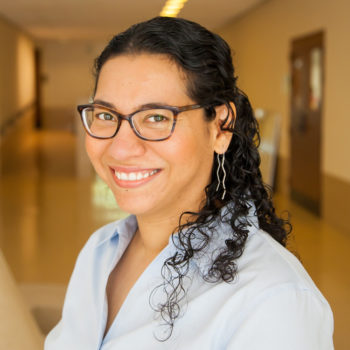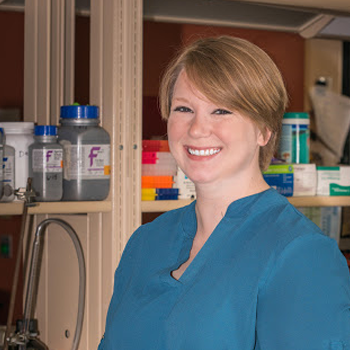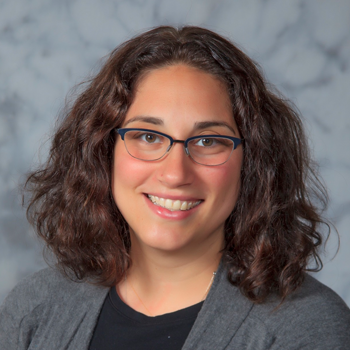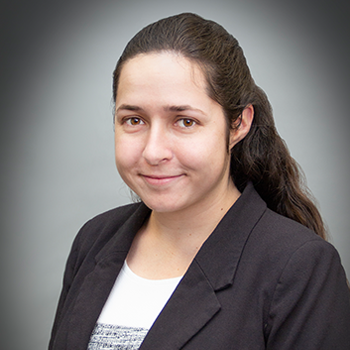2020-2021 Wimmer Faculty Fellows
 Nesrine Affara
Nesrine Affara
Assistant Teaching Professor
Department of Biological Sciences
Mellon College of Science
Carnegie Mellon University - Qatar
Nesrine redesigned her Human Health and Diseases course to incorporate clinical scenarios that gave students the chance to apply course content to real-world examples. The fall section of the course enrolls non-major students, and Nesrine implemented the scenarios to “empower [these students] with enough confidence and analytical thinking” to solve tangible scenarios. Nesrine designed the scenarios to include an individual “pre-work” assessment of student knowledge as well as an individual “post-reflection” assessment. This individual work prepared students for the in-class group work, where students exchanged different perspectives, engaged with new data for each scenario, and learned from each other’s ideas. Analysis of this group work component showed that it “significantly improved the ability of the students to understand the solve each clinical case.” Nesrine plans to continue using these clinical scenarios in future versions of the class and to see how – if at all – the results might vary when implemented with biology majors.
 Michael Hilton
Michael Hilton
Assistant Teaching Professor
Institute for Software Research
School of Computer Science
 Joshua Sunshine
Joshua Sunshine
Director, Undergraduate Research Program and Senior Research Fellow
Institute for Software Research
Human Computer Interaction Institute
School of Computer Science
Michael and Josh designed a new course entitled Crafting Software that aimed to teach programming to students who need programming skills as part of their undergraduate or graduate research, but whose work does not fall within the domains of computer science and computer engineering. In addition to improving their knowledge of programming, Michael and Josh hoped to improve the students’ sense of belonging and their self-efficacy. To do so, they implemented various strategies, including “changing attributions or reframing student believes about their place in the community of programmers” and “recognizing and encouraging students when they succeed in putting a new skill into action.” Josh and Michael administered self-efficacy and sense of belonging assessments at the beginning and end of their course. Analyses show that students’ average self-efficacy score increased from 3.33 to 3.92, and their average sense of belonging score increased from 4.07 to 4.43. The instructors plan to continue this focus on self-efficacy and sense of belonging when they teach the course again.
 Natalie McGuier
Natalie McGuier
Assistant Teaching Professor
Department of Biological Sciences
Mellon College of Science
Natalie designed a new course entitled Applied Research in Brewing Science to provide students with “minimal biology/chemistry background” a chance to apply “standard biological techniques to a relatable research question.” Students practiced these techniques by exploring the microbes in beer provided by a local brewery. By partnering with this brewery, Natalie not only provided her students with real-world example of biology in-action, but she also gave the brewery a chance to learn more about their microbes. Using pre- and post-test assessments, Natalie measured students’ understanding of experimental design as well as their self-reported likelihood to purse future STEM courses and research opportunities. Students reported that the hands-on lab were interesting and that they helped them “to learn proper techniques and lab etiquette.”
 Stephanie Rosenthal
Stephanie Rosenthal
Assistant Teaching Professor
Department of Computer Science
School of Computer Science
Stephanie redesigned her course entitled Autonomous Agents, a senior-level, artificial intelligence (AI) course that she developed to give students a chance to deploy and test an AI system in the form of an autonomous greenhouse. The course features a group project, and in previous versions of the course, students really struggled to work together in teams. To address this challenge, Stephanie developed a “Think-Pair-Share framework” that required students to work on individual assignments as preparation for their group work. Additionally, she required groups to regularly present their work to the class so that students could learn from each other. Stephanie reports that the groups were “much more successful this semester at growing plants in their greenhouses” and that “all of the groups reported better dynamics than those in previous semesters.” Stephanie also saw improvements in the final course evaluations, both in terms of student ratings for the course and her individual instructor ratings.
 Vickie Webster-Wood
Vickie Webster-Wood
Assistant Professor
The Biohybrid and Organic Robotics Group
Department of Mechanical Engineering
Department of Biomedical Engineering, by courtesy
College of Engineering
Vickie designed interactive demonstrations, tutorial videos, and virtual labs for her course entitled Gadgetry: Sensors, Actuators, and Processors, a lab-based course that was taught entirely online because of the COVID-19 pandemic. Vickie was interested in seeing how this combination of instructor-created resources would improve student learning of specific course concepts/content. Additionally, she explored whether student self-efficacy improved over the course of the semester. Analysis of student deliverables showed that students learned course concepts, though this learning does not to appear to be directly tied exclusively to either the demos or the labs. Additionally, analyses showed “substantial improvements in self-efficacy scores.” Vickie plans to continue implementing this approach and using these resources in future versions of the class.